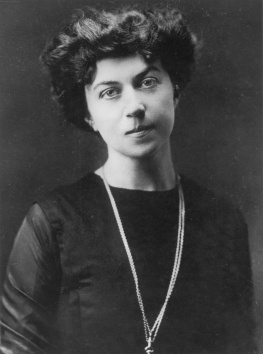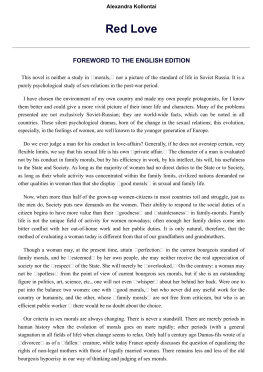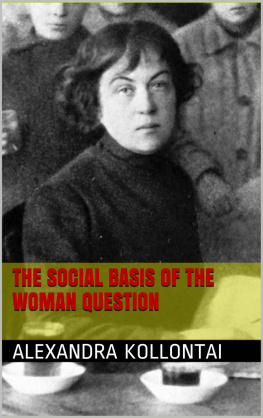Aleksandra Kollontai - Red Love
Here you can read online Aleksandra Kollontai - Red Love full text of the book (entire story) in english for free. Download pdf and epub, get meaning, cover and reviews about this ebook. genre: Prose. Description of the work, (preface) as well as reviews are available. Best literature library LitArk.com created for fans of good reading and offers a wide selection of genres:
Romance novel
Science fiction
Adventure
Detective
Science
History
Home and family
Prose
Art
Politics
Computer
Non-fiction
Religion
Business
Children
Humor
Choose a favorite category and find really read worthwhile books. Enjoy immersion in the world of imagination, feel the emotions of the characters or learn something new for yourself, make an fascinating discovery.
- Book:Red Love
- Author:
- Genre:
- Rating:4 / 5
- Favourites:Add to favourites
- Your mark:
- 80
- 1
- 2
- 3
- 4
- 5
Red Love: summary, description and annotation
We offer to read an annotation, description, summary or preface (depends on what the author of the book "Red Love" wrote himself). If you haven't found the necessary information about the book — write in the comments, we will try to find it.
Red Love — read online for free the complete book (whole text) full work
Below is the text of the book, divided by pages. System saving the place of the last page read, allows you to conveniently read the book "Red Love" online for free, without having to search again every time where you left off. Put a bookmark, and you can go to the page where you finished reading at any time.
Font size:
Interval:
Bookmark:
This novel is neither a study in morals, nor a picture of the standard of life in Soviet Russia. It is a purely psychological study of sex-relations in the post-war period.
I have chosen the environment of my own country and made my own people protagonists, for I know them better and could give a more vivid picture of their inner life and characters. Many of the problems presented are not exclusively Soviet-Russian; they are world-wide facts, which can be noted in all countries. These silent psychological dramas, born of the change in the sexual relations; this evolution, especially, in the feelings of women, are well known to the younger generation of Europe.
Do we ever judge a man for his conduct in love-affairs? Generally, if he does not overstep certain, very flexible limits, we say that his sexual life is his own private affair. The character of a man is evaluated not by his conduct in family morals, but by his efficiency in work, by his intellect, his will, his usefulness to the State and Society. As long as the majority of women had no direct duties to the State or to Society, as long as their whole activity was concentrated within the family limits, civilized nations demanded no other qualities in woman than that she display good morals in sexual and family life.
Now, when more than half of the grown-up women-citizens in most countries toil and struggle, just as the men do, Society puts new demands on the women. Their ability to respond to the social duties of a citizen begins to have more value than their goodness and stainlessness in family-morals. Family life is not the unique field of activity for women nowadays; often enough her family duties come into bitter conflict with her out-of-home work and her public duties. It is only natural, therefore, that the method of evaluating a woman today is different from that of our grandfathers and grandmothers.
Though a woman may, at the present time, attain perfection in the current bourgeois standard of family morals, and be esteemed by her own people, she may neither receive the real appreciation of society nor the respect of the State. She will merely be overlooked. On the contrary: a woman may not be spotless from the point of view of current bourgeois sex morals, but if she is an outstanding figure in politics, art, science, etc., one will not even whisper about her behind her back. Were one to put into the balance two women: one with good morals, but who never did any useful work for the country or humanity, and the other, whose family morals are not free from criticism, but who is an efficient public worker there would be no doubt about the choice.
Our criteria in sex morals are always changing. There is never a standstill. There are merely periods in human history when the evolution of morals goes on more rapidly; other periods (with a general stagnation in all fields of life) when change seems to relax. Only half a century ago Dumas-fils wrote of a divorcee as of a fallen creature, while today France openly discusses the question of equalizing the rights of non-legal mothers with those of legally married women. There remains less and less of the old bourgeois hypocrisy in our way of thinking and judging of sex morals.
I do hope that this book will aid in combating the old, bourgeois hypocrisy in moral values and show once more that we are beginning to respect woman, not for her good morals, but for her efficiency, for her ingenuity with respect to her duties toward her class, her country and humanity as a whole.
Mexico City, March 10th, 1927
Vassilissa was a working-girl twenty-eight years old, a knitter by trade. Thin, anemic, a typical child of the city. Her hair, cut short after typhus, grew in curls. From a distance she looked like a boy. She was flat-chested, and wore a shirtwaist and a wornout leather belt. She was not pretty. But her eyes were beautiful: brown, friendly, observant. Thoughtful eyes. Those eyes would never pass by anothers sorrow.
She was a Communist. At the beginning of the war she had become a Bolshevik. She hated the war from the first. Collections had been made in the shop for the front; people were ready to work overtime for the Russian victory. But Vassilissa objected. War was a bloody horror. What was the good of it? War brought hardships to the people. And you felt so sorry for the soldiers, the poor young fellows like sheep being led to the slaughter. When Vassilissa met a detachment on the street, going to war in full military array, she always had to turn away. They were going to meet death, but they shouted and sang at the top of their lungs! And how lustily they sang, as if they were out for a holiday. What forced them? They should have refused: We wont go to our death; we wont kill other men! Then there would be no war.
Vassilissa was able to read and write well; she had learned from her father, a compositor. She read Tolstoy and liked his work.
In the shop she was the only one for peace. She would have been discharged, but all hands were needed. The manager looked askance at her, but did not let her go. Soon Vassilissa was known throughout the district: she is against the war, a follower of Tolstoy. The women stopped speaking to her: she doesnt want to have anything to do with her country; she doesnt love Russia. She is lost!
Reports of her reached the local organizer, a Bolshevik. He became acquainted with Vassilissa, and talked with her; soon his opinion was formed; A girl of character; knows what shes about. The party could use her.
She was drawn into the organization. But Vassilissa did not become a Bolshevik immediately. She quarreled with the members of the Party. Asked them questions, and went away furious. After long deliberation she came back of her own accord, saying: I want to work with you.
During the Revolution she helped in the work of organization, and became a member of the Workers Council. She liked the Bolsheviki and admired Lenin because he opposed the war so uncompromisingly.
In her debates with the Mensheviki and the Social Revolutionists she spoke skilfully, heatedly, tempestuously, never at a loss for words. The other women, working-women, were timid, but Vassilissa always spoke up without hesitation whenever it was necessary. And what she said always was clear and to the point.
She won the respect of her comrades. Under Kerensky she was a candidate for the municipal Duma. The girls in the knitting-shop were proud of her. Now her every word was law. Vassilissa knew how to manage women, speaking amicably, upbraiding them, as the case required. She knew everyones troubles, for she had been in the factory herself since her girlhood. And she defended their interests. Her comrades sometimes rebuked her: Cant you forget your women? We have no time for them now there are more important things.
Vassilissa flared up, gave the Comrades a good berating, and quarreled with the district secretary. But she did not withdraw her demands. Why are womens affairs less important? This idea is a habit with all of you. Thats why women are backward. But you cant have a revolution without the women. Woman is everything. Man does what she thinks and suggests to him. If you win over the women, half your work is done.
Vassilissa was very belligerent in 18. She knew what she wanted; and she did not compromise. The others relaxed a bit in the last few years, lagged behind and stayed at home. But Vassilissa carried on. Always fighting, always organizing something, always insisting on a definite point.
She was tireless. Where did she get her energy? She was delicate, with not a drop of blood in her face only eyes. Sympathetic eyes, intelligent and observant.
Font size:
Interval:
Bookmark:
Similar books «Red Love»
Look at similar books to Red Love. We have selected literature similar in name and meaning in the hope of providing readers with more options to find new, interesting, not yet read works.
Discussion, reviews of the book Red Love and just readers' own opinions. Leave your comments, write what you think about the work, its meaning or the main characters. Specify what exactly you liked and what you didn't like, and why you think so.










